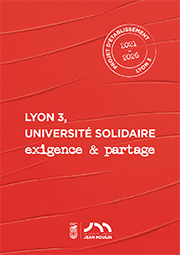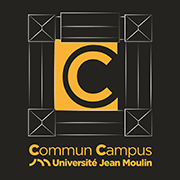AccueilRechercheLes productions scientifiquesThèsesThèses soutenuesThèses soutenues - 2006-2020Thèses soutenues - 2013
-
Partager cette page
- Recherche,
UDRESCU Florin
Le concept contemporain du Djihad à l'épreuve des pratiques discursives des acteurs radicaux sur l'Internet
Publié le 15 avril 2013 – Mis à jour le 15 avril 2013
Thèse en Science Politique - soutenue le 12 avril 2013
Sur le thème du djihad, le discours islamiste radical qui se propage dans le cyberespace, suite aux attentats du 11 septembre, se nourrit d’une interaction entre la reconfiguration d’un héritage religieux et la technique numérique. En cela, la rhétorique déployée par les acteurs centraux d’Al Qaida fait émerger un espace de représentation et d’action inédit d’une violence prônée au nom du djihad. Ce concept, initialement fruit d’une construction juridique qui en fait une « doctrine déontologique », se retrouve vidé de sa substance normative et symbolique pour se rigidifier dans une clôture réflexive et n’être plus qu’un faire-valoir à des théories et des pratiques terroristes. Il s’agit, dés lors, de saisir les dynamiques qui sont à l’œuvre autour des captures de sens opérées par les acteurs du discours radical contemporain. Fondamental est l’enjeu de la mémoire collective et la manière dont le discours radical la capte de manière sélective pour la détourner au profit d’un bricolage conceptuel. Associée aux modalités techniques du medium Internet, la virtualisation constitue un puissant vecteur d’action performative. À cet égard, une analyse des interactions liant de manière consubstantielle action physique et action discursive, activisme et discours, contribuera à prendre la mesure d’une pragmatique discursive dans ses épaisseurs à la fois sémantiques et contextuelles.
Concerning the topic of djihad, radical Islamist discourse that spreads in the cyberspace following the attacks of September 11, feeds on an interaction between the reconfiguration of a religious heritage and the digital technology. Thus, the rhetoric deployed by the central actors of Al Qaeda generates a new space of performance and action of a violence advocated in the name of djihad. This concept, which initially is the result of a legal construction which makes it an “ethical doctrine”, becomes emptied of its normative and symbolic substance to stiffen in a reflexive closure used to assert the theories and the terrorist practices. Henceforth, it is necessary to grasp the dynamics at work in the seizures of the significations operated by the actors of contemporary radical discourse. Fundamental is the issue of the collective memory and the way that the radical discourse captures it, selectively, to divert it for the benefit of a conceptual bricolage. Associated with the technical modalities of the Internet medium, the virtualization is a powerful vector of performative action. In this regard, an analysis of the interactions linking in a consubstantial way the physical and discursive action, activism and discourse, will take the measure of the discursive pragmatics in its both semantic and contextual thickness.
Mots clés : Djihad, Jihad, islamisme radical contemporain, Internet, analyse de discours, actions violentes, pratiques discursives, mémoire collective, image, martyr, terrorisme
Key words : Djihad, Jihad, contemporary radical Islamism, Internet, discourse analysis, violent actions, discursive practices, collective memory, image, martyr, terrorism
Directeur de thèse : Jean-Paul JOUBERT
Concerning the topic of djihad, radical Islamist discourse that spreads in the cyberspace following the attacks of September 11, feeds on an interaction between the reconfiguration of a religious heritage and the digital technology. Thus, the rhetoric deployed by the central actors of Al Qaeda generates a new space of performance and action of a violence advocated in the name of djihad. This concept, which initially is the result of a legal construction which makes it an “ethical doctrine”, becomes emptied of its normative and symbolic substance to stiffen in a reflexive closure used to assert the theories and the terrorist practices. Henceforth, it is necessary to grasp the dynamics at work in the seizures of the significations operated by the actors of contemporary radical discourse. Fundamental is the issue of the collective memory and the way that the radical discourse captures it, selectively, to divert it for the benefit of a conceptual bricolage. Associated with the technical modalities of the Internet medium, the virtualization is a powerful vector of performative action. In this regard, an analysis of the interactions linking in a consubstantial way the physical and discursive action, activism and discourse, will take the measure of the discursive pragmatics in its both semantic and contextual thickness.
Mots clés : Djihad, Jihad, islamisme radical contemporain, Internet, analyse de discours, actions violentes, pratiques discursives, mémoire collective, image, martyr, terrorisme
Key words : Djihad, Jihad, contemporary radical Islamism, Internet, discourse analysis, violent actions, discursive practices, collective memory, image, martyr, terrorism
Directeur de thèse : Jean-Paul JOUBERT
Membres du jury :
Jean LECA, Professeur émérite, IEP de Paris
Mohamed TOZY, Professeur, Université Hassan II
Hassan SALHOUL, Professeur, Université Jean Moulin Lyon 3
Olivier CHRISTEN, Vice-Procureur, Chef de section Antiterroriste au Parquet de Paris
Frédéric RAMEL, Professeur, IEP de Paris
Jean-Paul JOUBERT, Professeur, Université Jean Moulin Lyon 3
Président du jury : Hassan SALHOUL
Mention : Très honorable
Equipe d'accueil : Francophonie - CLESID
Documentation
Mise à jour : 15 avril 2013



